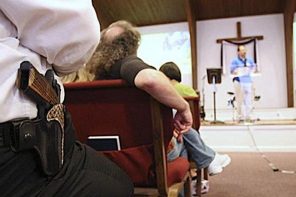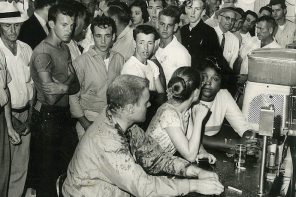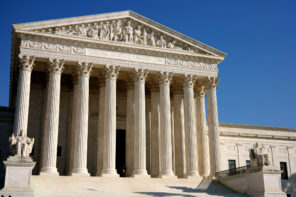The following article was originally posted on The Immanent Frame, a project of the SSRC.
JON MEACHAM: Senator, we’ve heard about HIV/AIDS. Many people here are concerned about Darfur and a number of other humanitarian issues. Why do you think it is that a loving God allows innocent people to suffer?
HILLARY CLINTON: Well—
(LAUGHTER)
JON MEACHAM: And we just have 30 seconds…
A funny thing happened on the way to last Sunday’s Compassion Forum: the politics of religion gave way to the politics of confession. While Newsweek editor Jon Meacham’s 30-second warning was obviously tongue-in-cheek, the insinuation was not far off the mark considering the overall tone of the televised event. In addition to this being one of the very few questions that might actually have shed some light on the complex relationships of theology and public policy, this was also the only question of the entire night that began with the word ‘why’.
The rest of the forum was dominated by relatively banal Yes-or-No questions that, while substantive, were largely predicated on the assumption that religion applies to the moral, altruistic side of politics and nothing more. The questions (posed by CNN moderators as well as a multi-faith menagerie of usual suspects) were seemingly meant to induce self-scrutinizing affirmations from both Democratic candidates; confessions that God is indeed mysterious and awesome, and that being a “person of faith” means feeling compassion for those who suffer (and, in Clinton’s case, switching to compact fluorescent bulbs).
Perusing CNN’s transcript of the event, I couldn’t help thinking about how questions regarding “faith in politics” often resort to the confessional “What Do You Believe?” standard borrowed directly from historical Christian liturgies. Like sinners at the church altar, presidential candidates offer themselves up to be held accountable for their beliefs while relying on the deceptively generic language of “faith” in an effort to appear biblically devout and devoutly ecumenical all at once. In the process, the finer points of Christian theodicy, cosmology, and eschatology inevitably fall by the wayside, in favor of contemplative reflections on hope, redemption, justice, and compassion.
The strange thing is that our society has gone straight from overlooking the significance of religion in public life to consistently misrecognizing it. The mass media wait for a national election cycle so that they can prod the candidates to perform their faith, and the candidates seek opportune moments to look and sound faithful. The Compassion Forum was just such a moment, and the fact that it was an evening specifically designated for confessional performances is glaring evidence that, as far as popular perceptions of political culture are concerned, “religion” is still compartmentalized as a separate and distinct phenomenon of the human condition. I don’t mean that religion is excluded from the realm of politics—far from it. But for all the attention it gets, the public issue of religion and politics is all too often reduced to “moral” questions that are meant to highlight the particular faithfulness (or lack thereof) of individual political figures; questions about the sanctity of life, the recognition of human of suffering, and the moral imperatives of tolerance and goodwill.
Undoubtedly, the politics of confession have widespread popular appeal, and they may correspond precisely to what many so-called “religious voters” are looking for, as they consider their vote. When George W. Bush cited Jesus Christ as his favorite political philosopher, religionists and secularists alike wanted to know what he meant, how deeply he meant it, and whether it made him a “wacky” evangelical or a “good” one. When Rev. Jeremiah Wright’s incendiary remarks became public, everyone wanted to know whether Barack Obama shared the same beliefs, how deeply he shared them, and whether doing so made him a “wacky” black Christian or a “good” one.
However, as a result of our endless preoccupation with faith as an indicator of an individual’s moral compass, spiritual empathy, and ethical fortitude, we (the media-consuming public) succumb to a narrow confessional discourse of sinners and sojourners. We identify political speeches on faith as major benchmarks in US religious history, as though the institutional and grassroots movements that made those speeches possible in the first place were of secondary importance. And most intriguingly of all, we wonder why public policies driven by “people of faith” fail to show the kind of compassion that we think people who claim to be religious should wholly possess.
The problem is not simply one of hypocrisy or opportunism on the part of faith-based politicians. It is the problem of a public culture that reinforces the idea that American religiosity is necessarily and uniformly as individualistic as has long been assumed. Western society’s stubborn fondness toward the idea that religion is all about personal experience and private morality still to this day obscures the critical theoretical insights of Weber and Durkheim, that religious ideologies both inform and emanate from existing social norms and institutions, including those that might be historically classified as secular.
Instead of asking presidential candidates when they believe life begins, which is their favorite Bible story, and whether doctor-assisted suicide for the terminally ill is “morally okay,” what if there were televised public forums that explored the various religious (essentially Protestant) constructs that American political culture implicitly draws upon in relation to matters of policy and governance, even when “faith” is never directly invoked? What if more time was devoted to assessing the various theological and cosmological presuppositions that a sizable portion of the US population takes for granted as the foundation of American democracy, rather than giving presidential candidates more platforms to try and appease every one of them?
Those of us who are scholars, teachers, and public intellectuals should continue to take active steps to discourage the misdirection that occurs when the politics of confession becomes a smokescreen for deeper cultural and historical dynamics. We need to assert that religion is not just a source of abstract individualized standards of right and wrong, nor is it simply the wellspring of universal compassion. Religious traditions animate our legal, economic, educational, political, and penal systems in subtle yet profound ways. Religious sensibilities underlie diverse yet fundamental notions of jurisprudence and citizenship that circulate through the discourses and deeds of our daily lives, whether we choose to “cling” to them or not.




